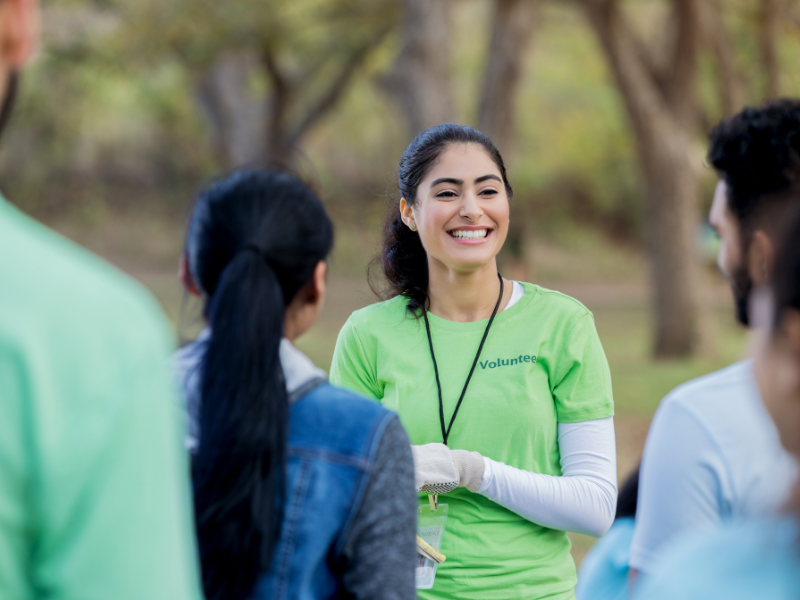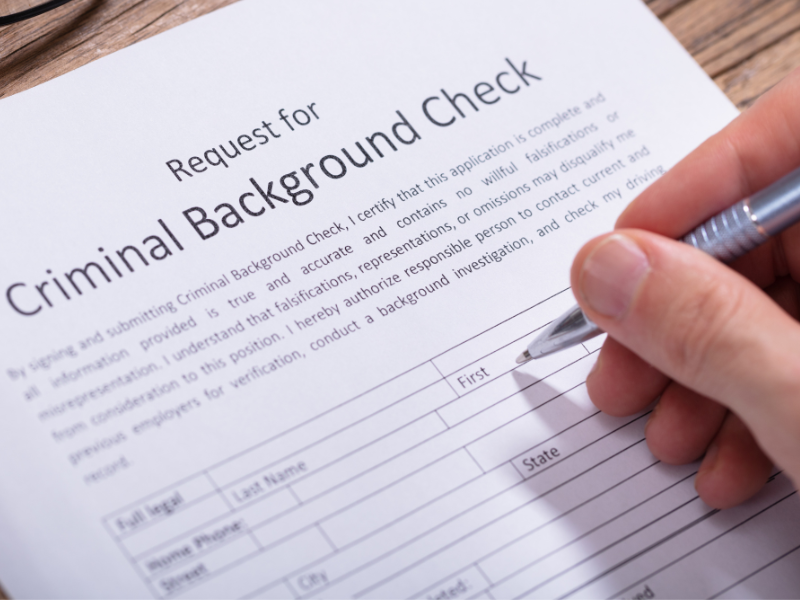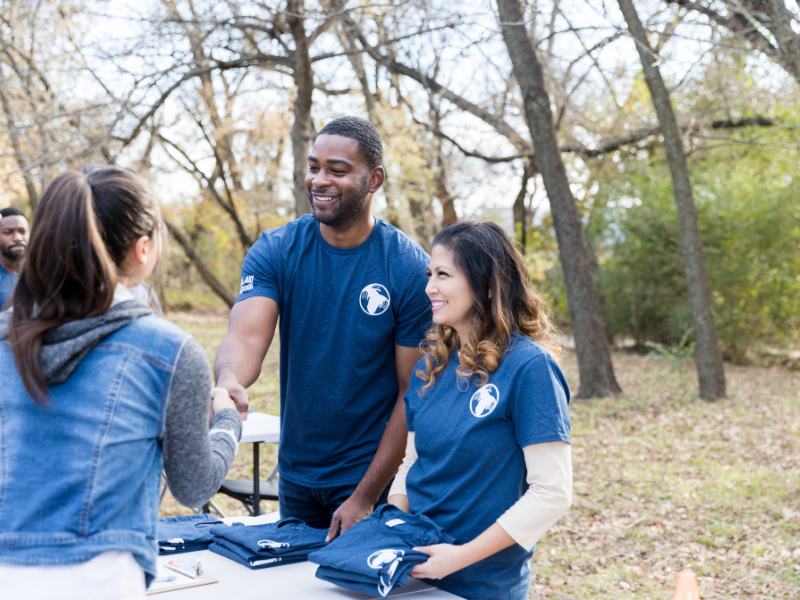
Do you need to background check volunteers who help with your nonprofit’s programs? Today, our nonprofit legal team will cover when it’s appropriate to background check volunteers, how you can do this easily, and other safety considerations you might want to take into account. When it comes to safety, remember that an ounce of prevention is worth a pound of cure. If you’re looking for help making your nonprofit’s programs safe, whether it’s through safety policies or otherwise, reach out to us for help.
Does My Nonprofit Need to Background Check Volunteers?
If you’re wondering if it’s necessary to background check volunteers, there are five key factors to analyze to know if you need to run a check. Those factors are proximity to clients, frequency, proximity to children, and sensitive information handling, which we’ll cover below. To find out if your nonprofit needs to run a background check, ask yourself:
1. Will this volunteer work directly with clients of the nonprofit?
Volunteering opportunities come in all shapes and sizes, some with client contact and some without.You’ll want to background check volunteers who are working directly with your clientele, whether you help with kids, the elderly, animals, etc. Make sure to pay special attention to any sex crimes, violent crimes or anything involving your mission. For example, for animal shelters, you’ll want to watch out for any animal cruelty charges.
For volunteers who don’t have direct contact with your clients, background checks can be done, but aren’t always a necessity. Tasks like sorting your donation bin of canned goods in an area where clients don’t have access is an example when a background check is much less important.
2. How frequently will this person volunteer?
Volunteers for one-time events and volunteers signing up for regularly scheduled volunteering hours are very different. Let’s say someone is volunteering at your annual gala fundraiser to check tickets at the door. You’re welcome to background check them, but is it needed? Probably not. There’s less likelihood for something to go wrong in a one-time experience vs an ongoing volunteering experience. And they’re not as likely to have access to sensitive information or clients.
On the other hand, if someone has signed up to volunteer monthly or even weekly with your organization, it would be more prudent to run a background check for the safety of your clients, staff and other volunteers. When someone has repeated interactions with your organization, it’s better to be safe than sorry.
3. Will there be any children present when this person is volunteering?
Even if your mission isn’t related to children, if you have family friendly volunteering opportunities, like a yard clean up, it might be wise to background check adult volunteers who will be in close proximity with children. Or you can check your state’s sex offender registry as a less intensive option. Some sex offenders are not allowed within proximity of schools or children, so it is crucial to know this information ahead of time. It’s also wise to check to ensure parents feel safe bringing their children back for any opportunities to help your mission in the future.
4. Will this person work with any confidential or sensitive information?
The last thing to consider is one that is often missed. Will this person handle any sort of confidential information? It’s common to have volunteers help with administrative tasks like scanning or organizing documents, or welcoming clients at the door. But if your cause involves confidential information, including clients’ physical or mental health information, credit card number or social security number, you’ll need to background check volunteers who handle that information. If your cause has any safety or security risks, like a domestic violence shelter, you’ll need to be even more stringent. In that scenario, the addresses of clients when they move out is incredibly sensitive information that will need to be protected.
Keep in mind, donation and donor information is also sensitive. If you have a volunteer collecting money on behalf of the organization or entering donor information, it is wise to check their record for any history of financial crimes to best protect the nonprofit.
5. Will this person drive the nonprofit’s vehicle?
If your nonprofit owns vehicle(s), consider background checking volunteers who will drive the vehicles. You’ll want to check their driving record to see any issues there and ensure their license is in good standing. For insurance purposes, many nonprofits don’t allow volunteers to drive their vehicles or require special training and authorization to drive the organization’s vehicles.
How Can My Nonprofit Background Check Volunteers?

Types of Background Checks
First, note that there are different levels of background checks. What’s right for a volunteer who drives the company van might not be right for the volunteer working directly with kids. In terms of the types of background checks you might want to run, consider:
- Criminal history (this is the most common type)
- Driving record
- Sex offender registry check
- Social media check
- Reference check
- Drug screening
- Social security number trace
Ways to Background Check Volunteers
The easiest way to background check volunteers is to use a paid service. Before you turn away from this option, keep in mind, a background check is much less expensive than handling any sort of crisis that results from having unsafe volunteers cause harm. Paid services for background checks are often comprehensive, covering databases in multiple states and counties, as well as the federal databases. They can also provide more than one type of check, including sex offender registries, criminal checks and driving checks. Some will even alert you if a volunteer has been arrested or can also provide drug screening services or safety training. Usually, these online services will allow your volunteer to fill out an online form including information like:
- Their full name
- Their last 3 addresses
- Their social security number
- Any aliases they’ve used
If you’re looking for another option, be ready to invest some time in it, depending on how many volunteers you need to check. You’ll want the last several addresses of the person in order to handle this yourself, as well as any other names they’ve gone by, like if they have a maiden name. You’ll want to check any county, state and/or federal databases like:
- Local law enforcement agencies
- Court records
- National Sex Offender Registry
- State or local sex offender registries
The trouble with DIYing your background checks or even using a company that is not reputable is that you’re running the risk of missing something. We don’t suggest going this route. There are plenty of companies that provide background checks inexpensively. Some nonprofits have the volunteer pay for their own background check fully or partially to help offset the cost.
What Other Safety Measures Can We Put in Place?
Depending on the type of work you do, it’s wise to have plenty of safety precautions in place. This list isn’t exhaustive, but will give you a good starting point.

1. Safety Policies and/or Procedures
We have two quick blog posts on a few safety policies and procedures we suggest depending on the type of nonprofit. For anyone working with a vulnerable population like children, animals or the elderly read more about policies we suggest to keep staff, clients, and volunteers safe. Churches and other religious organizations have a few special considerations to take into account.
Generally speaking, your policies and procedures should be clear and easy to follow. Ideally, they outline clear expectations for volunteers and staff, like having multiple people in the room for any work with a child, for example. These policies can help protect everyone involved and the organization as a whole. If you need help figuring out what kind of safety policies your nonprofit should have, reach out! Our legal team is happy to strategize and create policies to keep your programs and people safe.
2. Staff Training
Training is a huge part of hiring staff. For nonprofits with paid staff, whether they’re contractors, part-time or full time, you’ll want to run a background check and provide adequate training. There are different trainings in each industry that make sense. Confirming staff have the proper licensure is also key in protecting the organization if you work in a field that involves physical or mental health, or heavy machinery.
Provide staff training, not just when they’re first hired, but on an ongoing basis. Allow staff time and space to ask questions and bring up any problems they notice with safety. These meetings might feel silly if you don’t find anything to discuss for a few weeks, but having a space that staff know they can bring any safety questions or concerns is key to preventing incidents.
3. Volunteer Training
For volunteers, follow a similar format. Provide onboarding training when they first start volunteering, especially if they’ll be volunteering more than once. Weekly or monthly volunteers will need more training than a one-time event volunteer, so plan for that. Let volunteers know what to do if they have any safety concerns. Having a safe space to voice any issues is important. Shadowing an existing volunteer or staff member can also reinforce proper safety guidelines and show volunteers what those policies look like when they’re in action.
4. Reference Checks
Last but not least, it’s never a bad idea to have volunteers, especially those working directly with clients, provide references. Character references can be a great way to get a little more piece of mind with volunteers working with sensitive information or delicate situations. For example, if someone will be volunteering with veterans with PTSD, confirming with their references that they have a calm demeanor even under pressure, can be a great idea to make sure it’s a good fit. You can require volunteers to provide references from other organizations they’ve volunteered with, employers or even references from your current pool of volunteers if they already know someone involved with your nonprofit.
There’s not a one-size-fits-all approach to safety for nonprofits. But if your nonprofit starts with background checking volunteers properly and having good safety practices in place, you can get started on the right foot. If you’re looking for help with creating nonprofit safety policies, reach out! Our attorneys work exclusively with nonprofits and are happy to help.
- Background Check Volunteers and Other Safety Considerations for Nonprofits - July 24, 2024
- How Much Does it Cost to Set Up a 501c3? - July 12, 2024
- How to Start an Animal Rescue: Get 501c3 Status and More! - May 30, 2024

